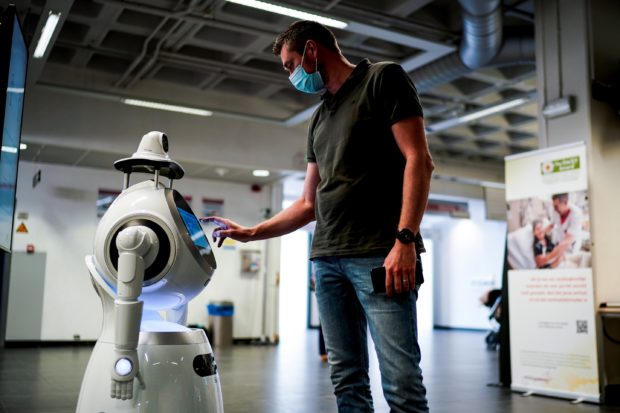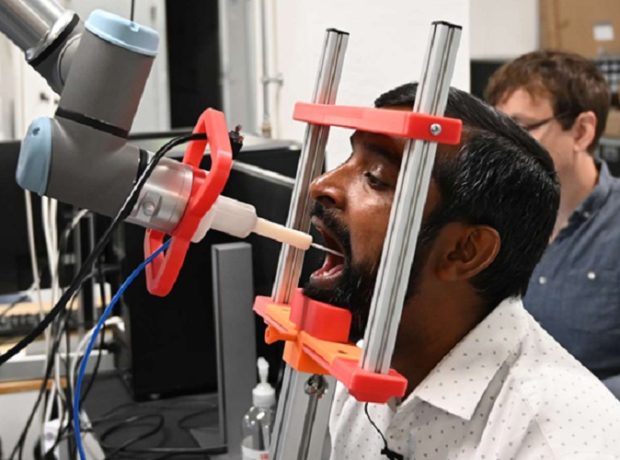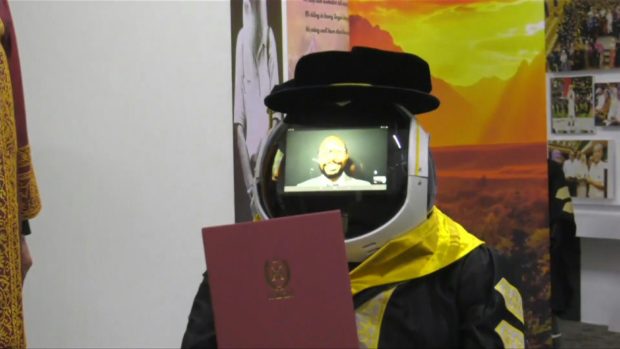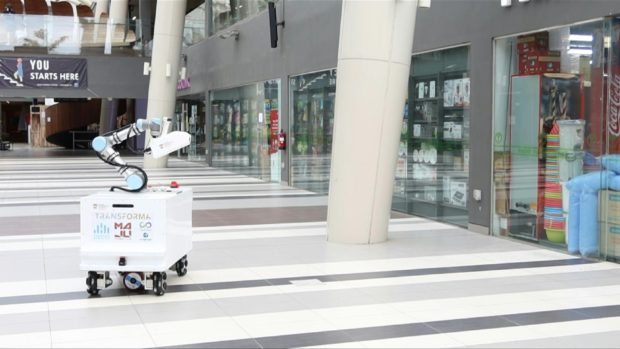Productivity? Entertainment? How visions of robots differ around the world
As technology continues to advance and software continues to get smarter, scientists across the world are developing robots in humanoid and other forms to do everything from assisting healthcare workers to stepping in for students so that they can safely participate in their university graduations.
So how are people across the world using such intelligent tech to improve their lives in recent months? Take a look at the following:
Belgium: Robotic butlers

A Belgian company ZoraBots’ employee tests a robot called CRUZR on May 29, 2020 at University Hospital Antwerp in Antwerp. Image: AFP/Kenzo Tribouillard via AFP Relaxnews
In late May, Belgian company ZoraBots began testing their CRUZR robots as healthcare worker aids at the University Hospital Antwerp (UZA) in Antwerp. This semi-humanoid robot was programmed to screen the temperatures of hospital visitors and detect if they are wearing a mask or not. Using a CRUZR to do these basic tasks helps hospital workers reduce their contact with potentially infected patients.
Denmark: Healthcare robots

In Denmark, robots swab patients for coronavirus testing. Image: courtesy of University of Southern Denmark via AFP Relaxnews
Also in May, the University of Southern Denmark announced that it had created robots to help with COVID-19 screening. While not resembling a complete human, this robotic arm can swab patients and then be swapped out for each test to ensure the testing area stays as sanitary as possible.
Taiwan: Drumming robots

In Taiwan, robot drummers entertain an empty baseball stadium. Image: AFp/AFPTV/Sean Chang via AFP Relaxnews
Though a public audience has not been allowed to attend Taiwan baseball games due to the coronavirus outbreak, that doesn’t mean the players have to play for an empty stadium; since April, not only have cardboard cutouts of fans and plastic mannequins been filling the stands, but also drum-playing robots have hyped up the “audience” ambiance. In fact, five of these musical bots were put together and synchronized to play music for the baseball players.
Malaysia: Robotic graduates

In Malaysia, robots step in for students at graduation ceremonies. Image: courtesy of Universiti Sultan Zainal Abidin via AFP Relaxnews
Considering that large gatherings of people are banned worldwide to reduce the spread of the coronavirus, students are unable to attend their graduation ceremonies as a great deal have been canceled. In response, some universities, like the Universiti Sultan Zainal Abidin in Malaysia, have considered having their graduates make their walk to their diplomas digitally — with their head displayed on a screen perched upon a robot wearing a cap and gown.
While the students of this university strongly vetoed this idea in early June, other colleges throughout the world have considered the same or went ahead and performed such robotic ceremonies.
Singapore: Surface-disinfecting robots

In Singapore, robots help keep public spaces safe by spraying disinfectant over large areas. Image: AFP/AFPTV/Nanyang Technological University Catherine Lai via AFP Relaxnews
Similar to the University of Southern Denmark’s swabbing robotic arm, a robotic arm developed in Singapore has also been created to help healthcare professionals combat COVID-19. Instead of screening patients for the disease, however, the XDBOT by NTU Singapore can spray disinfectant on large surfaces by being remotely controlled by a human. Testing for this bot began this past April. IB
RELATED STORIES:
Demand for robot cooks rises as kitchens combat COVID-19
For more news about the novel coronavirus click here.
What you need to know about Coronavirus.
For more information on COVID-19, call the DOH Hotline: (02) 86517800 local 1149/1150.
The Inquirer Foundation supports our healthcare frontliners and is still accepting cash donations to be deposited at Banco de Oro (BDO) current account #007960018860 or donate through PayMaya using this link.